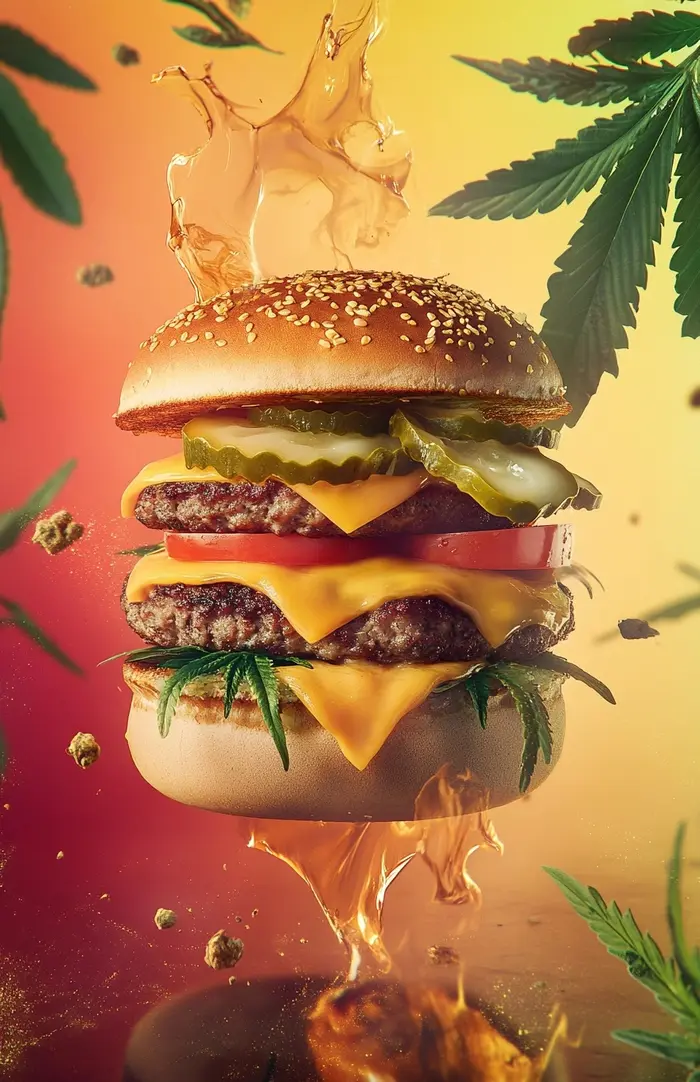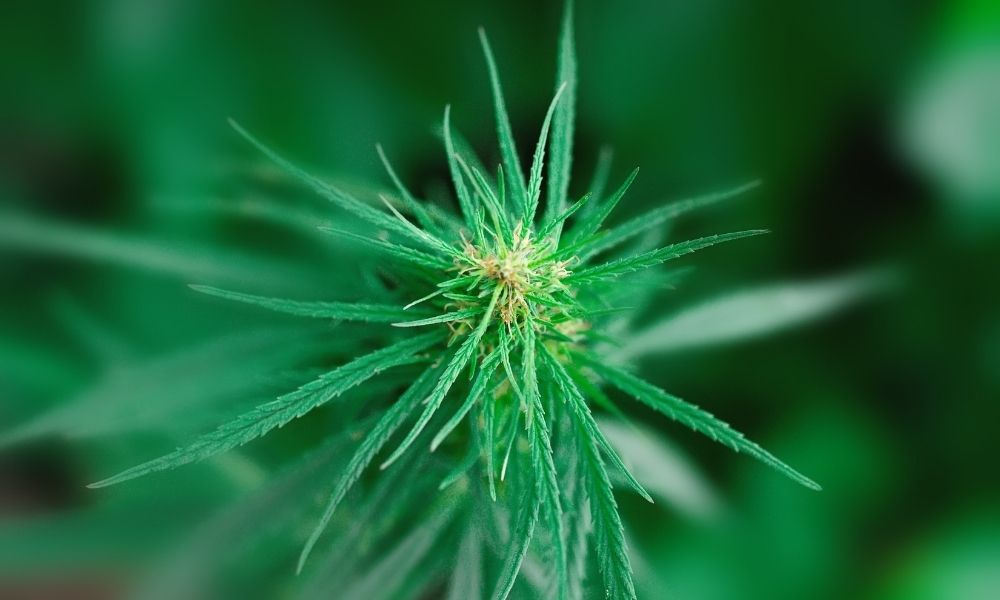

THC and CBD have almost identical molecular structures, with only a handful of key differences. Because of the similarities, some people might wonder if the two compounds will affect them in the same ways. THC is infamous for causing the sensation known as “munchies,” but what about CBD? Does CBD make you hungry?
In the simplest of terms, no, it doesn’t. CBD won’t stimulate your hunger the same way THC does, but it will provide other benefits that can promote a thriving appetite. We hear you wondering, “how can this be?” Well, allow us to explain.
Cannabidiol (CBD in friendly language) is a non-psychoactive cannabinoid found in cannabis. Non-psychoactive means that CBD will not induce the infamous high THC can create in consumers.
While CBD is similar to its cousin THC (tetrahydrocannabinol), the variances between the two compounds affect the consumer differently upon consumption.
Since the Farm Bill of 2018, hemp-derived CBD oil and other CBD products have been deemed federally legal as they only contain 0.3% or less THC. While CBD products are federally legal, CBD consumers should note that each state retains the right to enforce its laws concerning CBD.
By promoting internal balance, CBD can help your body in the following ways:
Nope! CBD doesn’t spark your appetite, so you don’t need to worry about ruining your diet. In fact, researchers found that CBD actually reduced the appetite of rats in one 2012 study. Some consumers also report mild appetite-reducing effects.
CBD won’t cut everyone’s appetite, though. If you avoid food because of an upset stomach, CBD can soothe that queasiness and make it easier for you to eat.
This goes to show that CBD generally balances your appetite — if your body needs more food, CBD can help you eat more. If you need less food, CBD helps you keep your hand out of the cookie jar.
For example, a person who is overwhelmed with stress and tension may eat more because of increased nerves. On the other side of the same coin, a person in immense pain may have little to no appetite. CBD’s calming and soreness-relieving properties may promote a healthier and more natural appetite in both of these instances.

It can — if you’re new to CBD or take too much. One commonly reported side effect of CBD consumption is the sensation known as “dry mouth.” This effect may be caused by the endocannabinoid system’s involvement in saliva production.
One 2006 Argentian study showed that both CB1 and CB2 receptors are present in the glands responsible for producing saliva. When these receptors are activated, you can experience dry mouth (also commonly referred to as “cotton-mouth”).
Dry mouth has no serious adverse effects, but it may make you quite thirsty. But to be fair, who wouldn’t benefit from adding an extra glass of water (or three) to their day?
CBD won’t make you hungry like marijuana. Rather, it may promote more natural eating patterns and help you eat when you normally can’t.
We know that CBD has developed quite a reputation for promoting balance and homeostasis within the body, specifically within the endocannabinoid system (or ECS for short). Many studies claim that balance in the digestive system can be easily achieved with a healthy ECS.
The ECS is a body-wide signaling network that helps several other systems, like your digestive and nervous systems, maintain balance. The ECS kicks in and helps the body respond to changes. When your ECS functions well, your body can regulate itself quickly and efficiently.
In recent times, it seems as though many CBD advocates regard the hemp-derived compound as a modern miracle for tension relief. Individuals suffering from digestive issues might experience swelling of the stomach area, tension, and bloating.
While these issues are often caused by illness, pent-up stress and anxiety are also common sources of tension, swelling, or bloating. Whether you consume a CBD edible or a full-spectrum CBD oil, the product will promote calmness and a feeling of relaxation throughout the mind and the body.
We’d like to note that a relaxed stomach provides an environment more suited for healthy digestion than an upset stomach.
Our bodies create potentially harmful free radicals when we digest food. But did you know that many studies suggest CBD can act as a powerful antioxidant?
The responsibility of the body’s natural antioxidants is to help neutralize free radicals and stop or delay any further damage to the harmed cells. Antioxidants help promote natural digestion and healthier cells, which may result in a more resilient gut.

Not every product will affect appetite, though all CBD products offer wellness benefits in one form or another. However, whether all CBD products will affect the consumer’s appetite is another topic altogether. In all honesty, not all CBD products are created equal, and some will have little to no effect on your stomach or appetite.
Let’s use topical CBD products as an example. Because topical products are applied to the skin and absorbed through the epidermis, the CBD will never pass through the stomach or even enter the bloodstream, for that matter. Because of this, it’s not possible for any topical CBD products to affect your appetite in any way.
While we’ve established that CBD lotion won’t make you hungry, but there are still plenty of CBD product out there that can help your appetite.
We’re sure you’re wondering, “but how will smoking or eating CBD affect my appetite? Will any of these CBD products make me hungry?” Well, wonder no longer, friend. We’re here to help shine a light on which products can help regulate your appetite.
While the effects of smoking or vaping CBD are short-lived, inhaling CBD will allow it to kick in the quickest, granting instant relief to the body, (including the stomach). When inhaling CBD, it will head directly from the lungs to the bloodstream, bypassing the digestive system entirely.
In our humble opinion, orally ingesting your CBD edibles, tinctures, or CBD capsules will probably be the best option for dealing with appetite. This is because these options will release CBD in the digestive tract.
Edibles slowly release CBD that travels through the stomach to the liver and bloodstream. This process takes some time, so edibles also happen to offer the longest-lasting effects.
When it comes to CBD and appetite, things can get a little bit complicated. Because everyone’s body and metabolism work differently, the optimal dose of CBD will vary from person to person.
Typically, CBD dosage is based primarily on personal preference and body weight. Some people may require more or less CBD than others for maximum benefits. We believe that it is best to start with the minimum dose and gradually work your way up until the desired effects are reached.
We recommend 0.25 mg of CBD per pound of bodyweight for a “regular dose,” and 0.5 mg per pound for a “strong” dose. Again, you should always start with a regular dose and work your way up. To calculate your doses, multiply your weight by 0.25 or 0.5. Here’s an example for a 160 lb person:
Although results will generally vary from person to person, it is always good practice to reap all of your CBD product’s potential benefits by obtaining your CBD from a trusted retailer.
Our sincere hope is that one day, we will know and understand the full effects that CBD products might have on the appetite. And as for the knowledge that we have currently about cannabis and the appetite, consumers would do well to remember that THC acts as an appetite stimulator, while CBD acts as an appetite regulator.